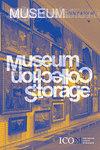标签机和合成器:收集科技博物馆的酷儿知识
IF 0.4
4区 艺术学
0 ART
引用次数: 0
摘要
摘要科学和技术博物馆体现了在性别平等问题上影响体制变革的潜力,积极影响未来的实践。本文认为,讲述故事的替代方法、创造性实践以及与新合作伙伴的合作在博物馆工作中至关重要;它们既确保了对性别和性行为多样性的代表性和认识,又促进了边缘化群体的平等。文章以奥地利维也纳技术博物馆的“关注性别”倡议为案例研究,探讨了博物馆的概念,以研究如何弥合广泛的理论和缺失的实践之间的差距。它询问了如何进行奇怪的阅读和收藏的多样化——以及由谁来完成?如何在数据库中记录多层但被排除在外的知识形式?本文提供了在科技博物馆及其他领域参与性别、LGBTQI+和活动家运动的创新方法和视角。本文章由计算机程序翻译,如有差异,请以英文原文为准。
Labelling Machines and Synthesizers: Collecting Queer Knowledge in Science and Technology Museums
Abstract Museums of science and technology embody the potential to affect institutional change on issues of gender equality, actively shaping future practices. This article argues that alternative methods of storytelling, creative practice and collaboration with new partners are crucial in museum work; they both ensure representation and awareness of the diversity of gender and sexuality and promote the equality of marginalised groups. Using the Focus Gender initiative at the Technical Museum Vienna, Austria as a case study, the article explores concepts for queering museums to examine how the gap between extensive theory and missing practice can be closed. It asks how a queer reading and diversification of collections is possible – and by whom? How can multi-layered yet excluded forms of knowledge be documented in databases? This article offers innovative approaches and perspectives for engagement with gender, LGBTQI+ and activist movements in the context of museums of science and technology and beyond.
求助全文
通过发布文献求助,成功后即可免费获取论文全文。
去求助
来源期刊

MUSEUM INTERNATIONAL
ART-
CiteScore
0.60
自引率
0.00%
发文量
0
期刊介绍:
In its new revised form Museum International is a forum for intellectually rigorous discussion of the ethics and practices of museums and heritage organizations. The journal aims to foster dialogue between research in the social sciences and political decision-making in a changing cultural environment. International in scope and cross-disciplinary in approach Museum International brings social-scientific information and methodology to debates around museums and heritage, and offers recommendations on national and international cultural policies.
 求助内容:
求助内容: 应助结果提醒方式:
应助结果提醒方式:


